Submitted:
10 September 2023
Posted:
12 September 2023
You are already at the latest version
Abstract
Keywords:
Introduction
Materials and Methods
- Identification of the main research areas in the publications of the Journal of Energy Research & Social Sciences for 2019-2023 based on the clustering of their bibliometric records.
- Identification of the main topics of publications related to social issues in energy research based on co-occurrence keyword clustering.
- Composition of definitions of the main terms on the subject on the basis of the texts of the publications under consideration.
- Identifying in combination with which informative phrases these terms most often appear in the text of article abstracts.
Results and Discussion
General characteristics of the sample of bibliometric records
Identification of the main research areas in the publications of the Journal of Energy Research & Social Sciences for 2019-2023 based on the clustering of their bibliometric records
Conclusion
Future prospects for the study
Conflicts of Interest
References
- Robertson Munro F, Cairney P. A systematic review of energy systems: The role of policymaking in sustainable transitions. Renewable and Sustainable Energy Reviews 2020;119:109598. [CrossRef]
- Wittmayer JM, Avelino F, Pel B, Campos I. Contributing to sustainable and just energy systems? The mainstreaming of renewable energy prosumerism within and across institutional logics. Energy Policy 2021;149:112053. [CrossRef]
- Radtke J, Scherhaufer P. A social science perspective on conflicts in the energy transition: An introduction to the special issue. Utilities Policy 2022;78:101396. [CrossRef]
- Brückmann G, Berger S, Caviola H, Hahnel UJJ, Piana V, Sahakian M, et al. Towards more impactful energy research: The salient role of social sciences and humanities. PLOS Clim 2023;2:e0000132. [CrossRef]
- Rudek TJ. Capturing the invisible. Sociotechnical imaginaries of energy. The critical overview. Science and Public Policy 2022;49:219–45. [CrossRef]
- Govindarajan HK, Ganesh LS. Integrating energy governance and environmental justice: Role of renewable energy. Renewable Energy Focus 2022;43:24–36. [CrossRef]
- Stephens JC. Energy Democracy: Redistributing Power to the People Through Renewable Transformation. Environment: Science and Policy for Sustainable Development 2019;61:4–13. [CrossRef]
- Ahlborg H, Ruiz-Mercado I, Molander S, Masera O. Bringing Technology into Social-Ecological Systems Research—Motivations for a Socio-Technical-Ecological Systems Approach. Sustainability 2019;11:2009. [CrossRef]
- Gaede J, Rowlands IH. Visualizing social acceptance research. Energy Research & Social Science 2018;40:142–58. [CrossRef]
- Dall-Orsoletta A, Cunha J, Araújo M, Ferreira P. A systematic review of social innovation and community energy transitions. Energy Research & Social Science 2022;88:102625. [CrossRef]
- Osiński S, Stefanowski J, Weiss D. Lingo: Search Results Clustering Algorithm Based on Singular Value Decomposition. In: Kłopotek MA, Wierzchoń ST, Trojanowski K, editors. Intelligent Information Processing and Web Mining, Berlin, Heidelberg: Springer Berlin Heidelberg; 2004, p. 359–68. [CrossRef]
- Waltman L, Van Eck NJ, Noyons ECM. A unified approach to mapping and clustering of bibliometric networks. Journal of Informetrics 2010;4:629–35. [CrossRef]
- Campos R, Mangaravite V, Pasquali A, Jorge A, Nunes C, Jatowt A. YAKE! Keyword extraction from single documents using multiple local features. Information Sciences 2020;509:257–89. [CrossRef]
- Harichandan S, Kar SK, Bansal R, Mishra SK, Balathanigaimani MS, Dash M. Energy transition research: A bibliometric mapping of current findings and direction for future research. Cleaner Production Letters 2022;3:100026. [CrossRef]
- Hess DJ, Sovacool BK. Sociotechnical matters: Reviewing and integrating science and technology studies with energy social science. Energy Research & Social Science 2020;65:101462. [CrossRef]
- Osazuwa-Peters M, Hurlbert M, McNutt K, Rayner J, Gamtessa S. Risk and socio-technical electricity pathways: A systematic review of 20 years of literature. Energy Research & Social Science 2021;71:101841. [CrossRef]
- Bloem S, Swilling M, Koranteng K. Taking energy democracy to the streets: Socio-technical learning, institutional dynamism, and integration in South African community energy projects. Energy Research & Social Science 2021;72:101906. [CrossRef]
- Thombs RP. When democracy meets energy transitions: A typology of social power and energy system scale. Energy Research & Social Science 2019;52:159–68. [CrossRef]
- Campos I, Marín-González E. People in transitions: Energy citizenship, prosumerism and social movements in Europe. Energy Research & Social Science 2020;69:101718. [CrossRef]
- Johnstone P, Rogge KS, Kivimaa P, Fratini CF, Primmer E, Stirling A. Waves of disruption in clean energy transitions: Sociotechnical dimensions of system disruption in Germany and the United Kingdom. Energy Research & Social Science 2020;59:101287. [CrossRef]
- Valencia F, Billi M, Urquiza A. Overcoming energy poverty through micro-grids: An integrated framework for resilient, participatory sociotechnical transitions. Energy Research & Social Science 2021;75:102030. [CrossRef]
- Priesmann J, Spiegelburg S, Madlener R, Praktiknjo A. Does renewable electricity hurt the poor? Exploring levy programs to reduce income inequality and energy poverty across German households. Energy Research & Social Science 2022;93:102812. [CrossRef]
- Velasco-Herrejon P, Bauwens T. Energy justice from the bottom up: A capability approach to community acceptance of wind energy in Mexico. Energy Research & Social Science 2020;70:101711. [CrossRef]
- Vågerö O, Zeyringer M. Can we optimise for justice? Reviewing the inclusion of energy justice in energy system optimisation models. Energy Research & Social Science 2023;95:102913. [CrossRef]
- Wagner A, Gałuszka D. Let’s play the future: Sociotechnical imaginaries, and energy transitions in serious digital games. Energy Research & Social Science 2020;70:101674. [CrossRef]
- Bellamy R, Chilvers J, Pallett H, Hargreaves T. Appraising sociotechnical visions of sustainable energy futures: A distributed deliberative mapping approach. Energy Research & Social Science 2022;85:102414. [CrossRef]
- Hirt LF, Sahakian M, Trutnevyte E. What socio-technical regimes foster solar energy champions? Analysing uneven photovoltaic diffusion at a subnational level in Switzerland. Energy Research & Social Science 2021;74:101976. [CrossRef]
- Gottschamer L, Zhang Q. The dynamics of political power: The socio-technical transition of California’s electricity system to renewable energy. Energy Research & Social Science 2020;70:101618. [CrossRef]
- Chung C, Kim J, Sovacool BK, Griffiths S, Bazilian M, Yang M. Decarbonizing the chemical industry: A systematic review of sociotechnical systems, technological innovations, and policy options. Energy Research & Social Science 2023;96:102955. [CrossRef]
- Baxter J, Walker C, Ellis G, Devine-Wright P, Adams M, Fullerton RS. Scale, history and justice in community wind energy: An empirical review. Energy Research & Social Science 2020;68:101532. [CrossRef]
- Dällenbach N, Wüstenhagen R. How far do noise concerns travel? Exploring how familiarity and justice shape noise expectations and social acceptance of planned wind energy projects. Energy Research & Social Science 2022;87:102300. [CrossRef]
- Cha JM. A just transition for whom? Politics, contestation, and social identity in the disruption of coal in the Powder River Basin. Energy Research & Social Science 2020;69:101657. [CrossRef]
- Sovacool BK, Hess DJ, Cantoni R. Energy transitions from the cradle to the grave: A meta-theoretical framework integrating responsible innovation, social practices, and energy justice. Energy Research & Social Science 2021;75:102027. [CrossRef]
- Dwarkasing C. Inequality determined social outcomes of low-carbon transition policies: A conceptual meta-review of justice impacts. Energy Research & Social Science 2023;97:102974. [CrossRef]
- Trencher G, Van Der Heijden J. Contradictory but also complementary: National and local imaginaries in Japan and Fukushima around transitions to hydrogen and renewables. Energy Research & Social Science 2019;49:209–18. [CrossRef]
- Marquardt J, Delina LL. Reimagining energy futures: Contributions from community sustainable energy transitions in Thailand and the Philippines. Energy Research & Social Science 2019;49:91–102. [CrossRef]
- Rosenbloom D. A clash of socio-technical systems: Exploring actor interactions around electrification and electricity trade in unfolding low-carbon pathways for Ontario. Energy Research & Social Science 2019;49:219–32. [CrossRef]
| [1] |
https://search.carrotsearch.com/#/workbench — Clustering Workbench. The expert-level Lingo3G application |
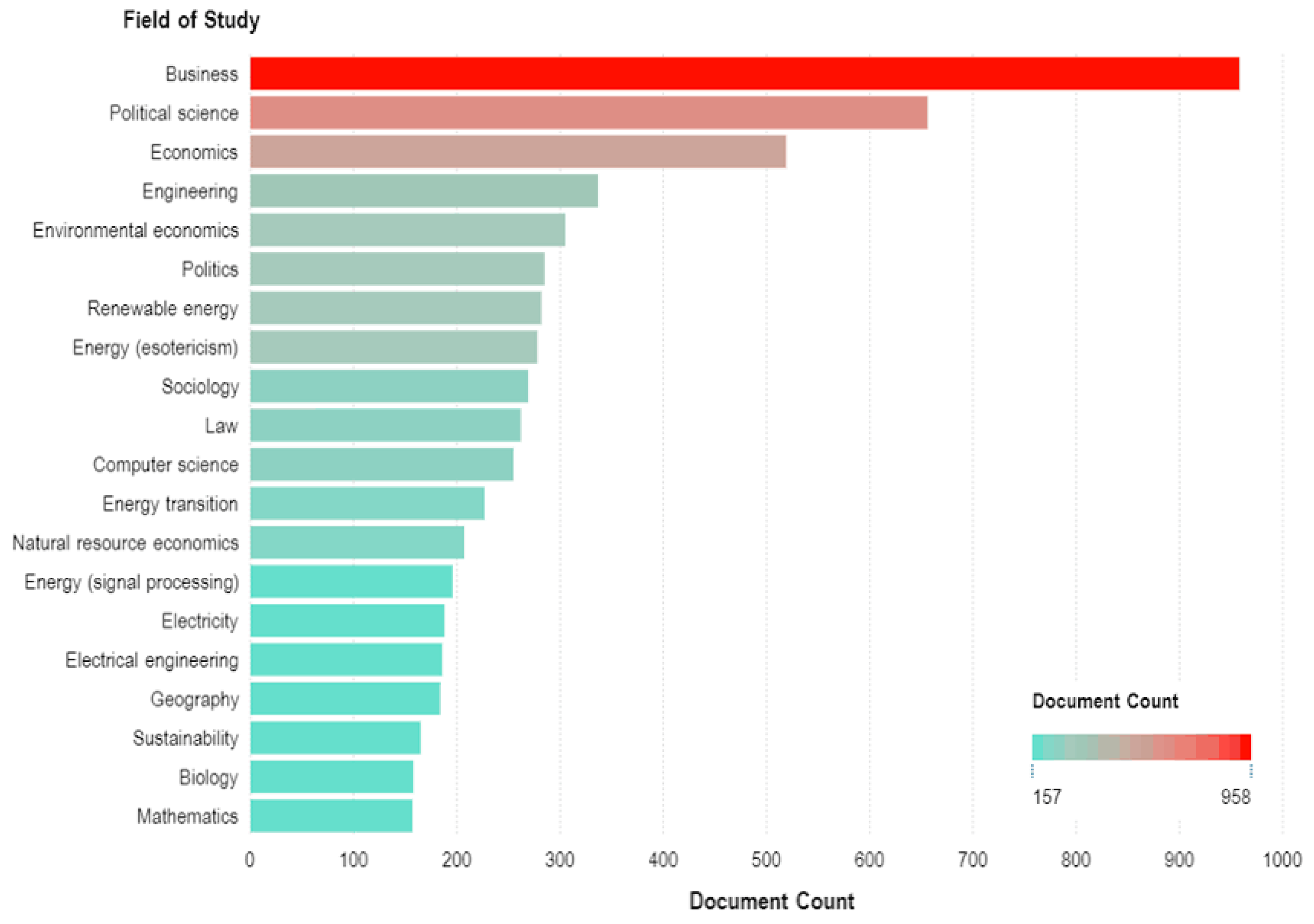
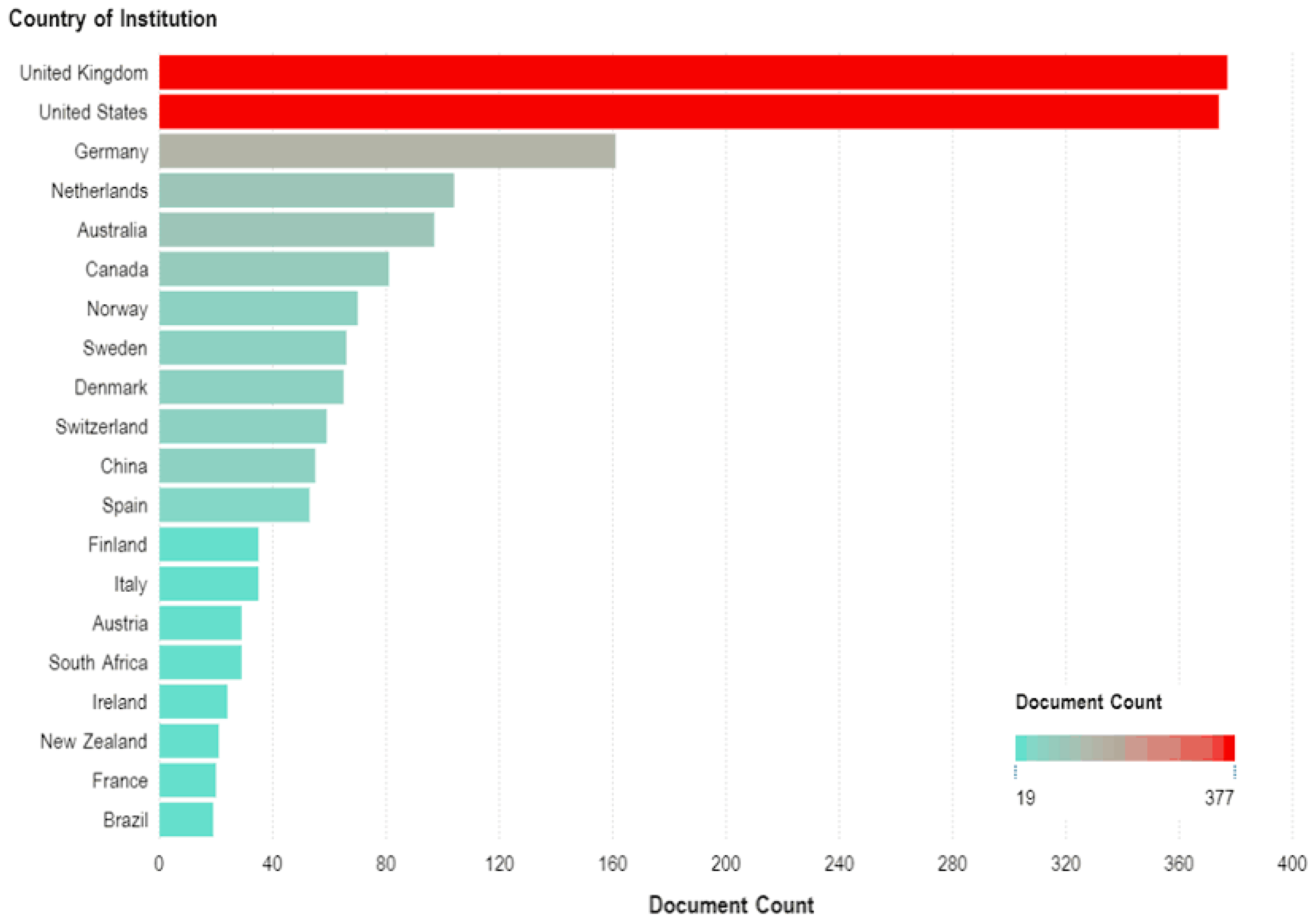
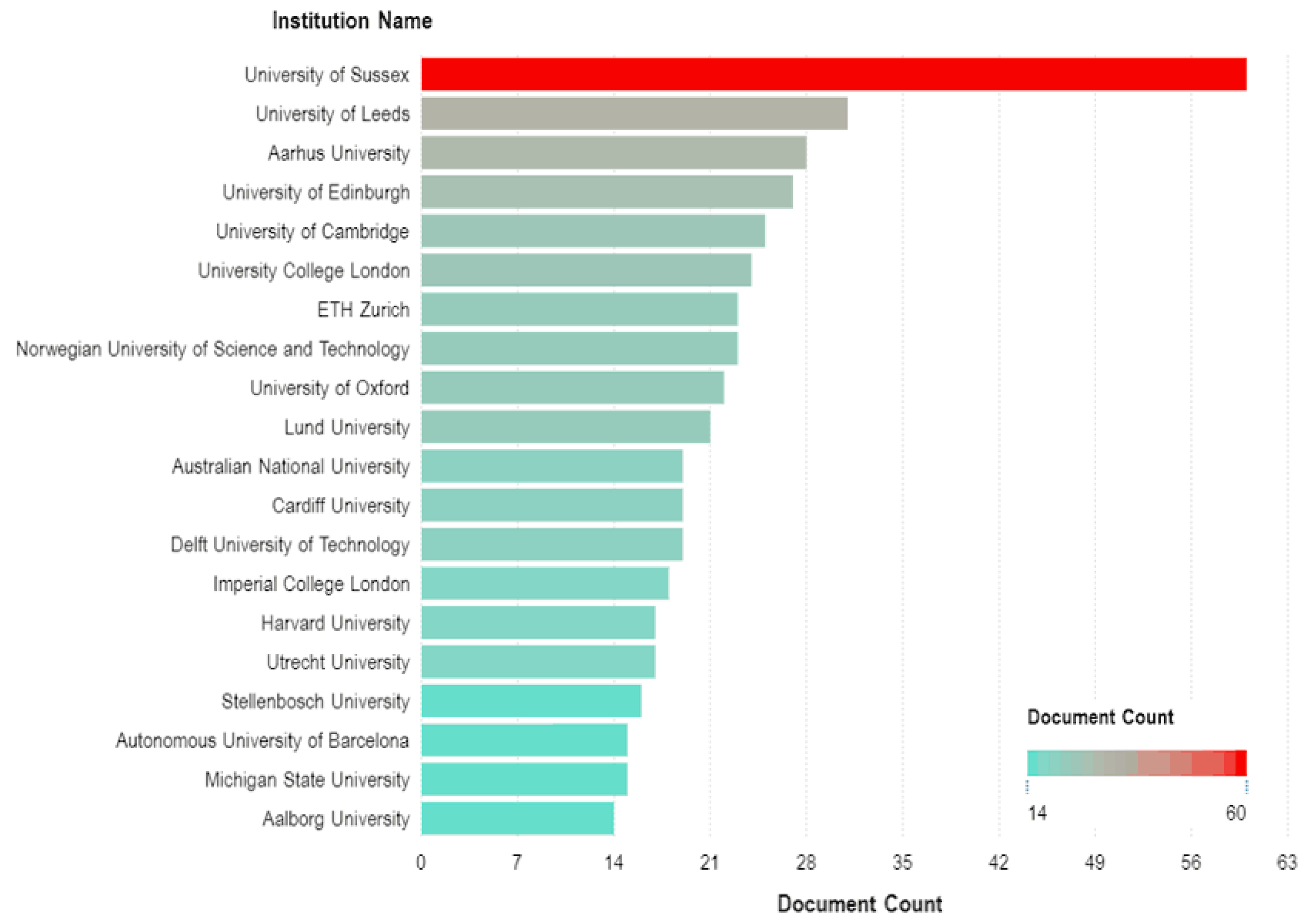
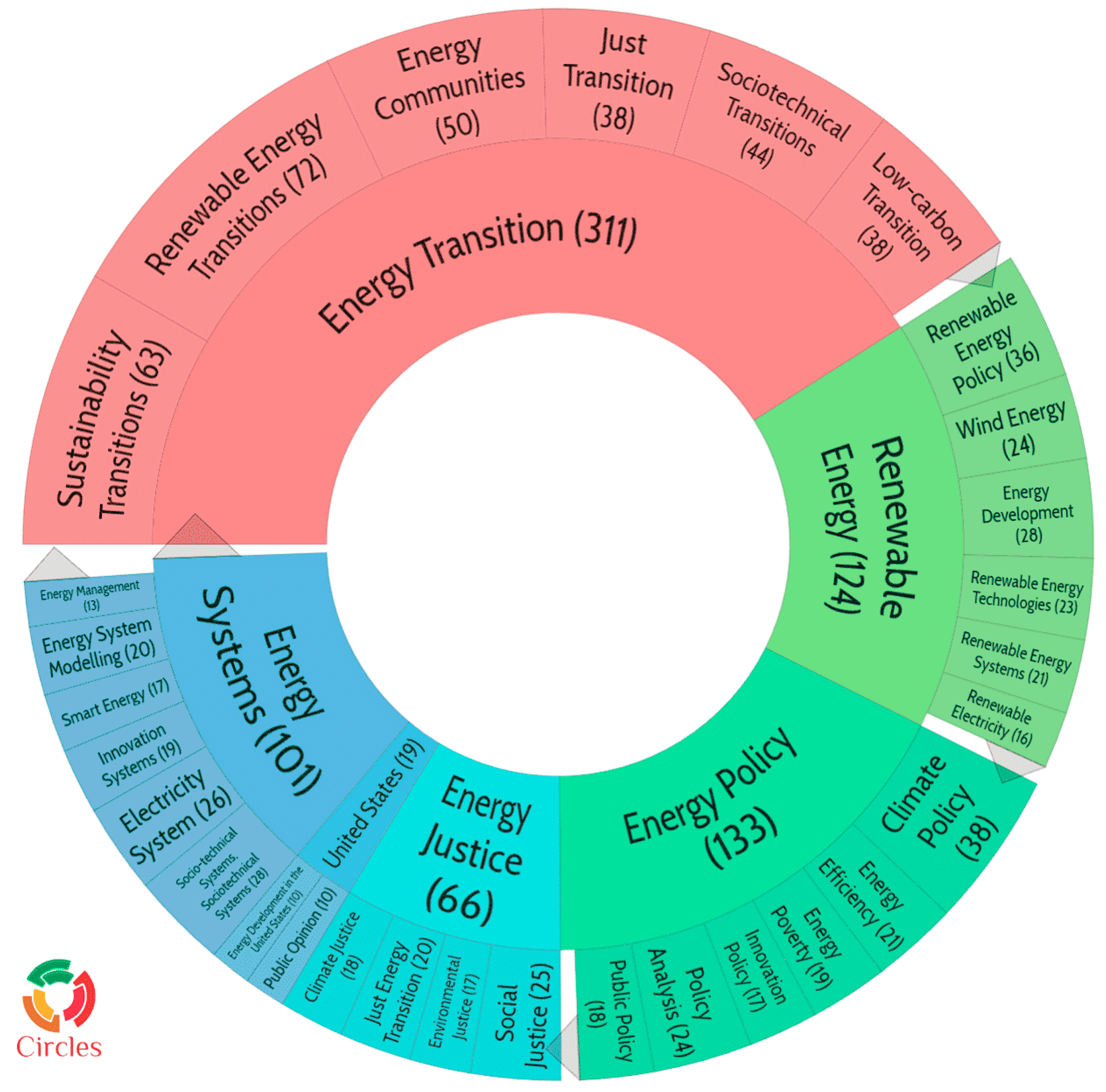
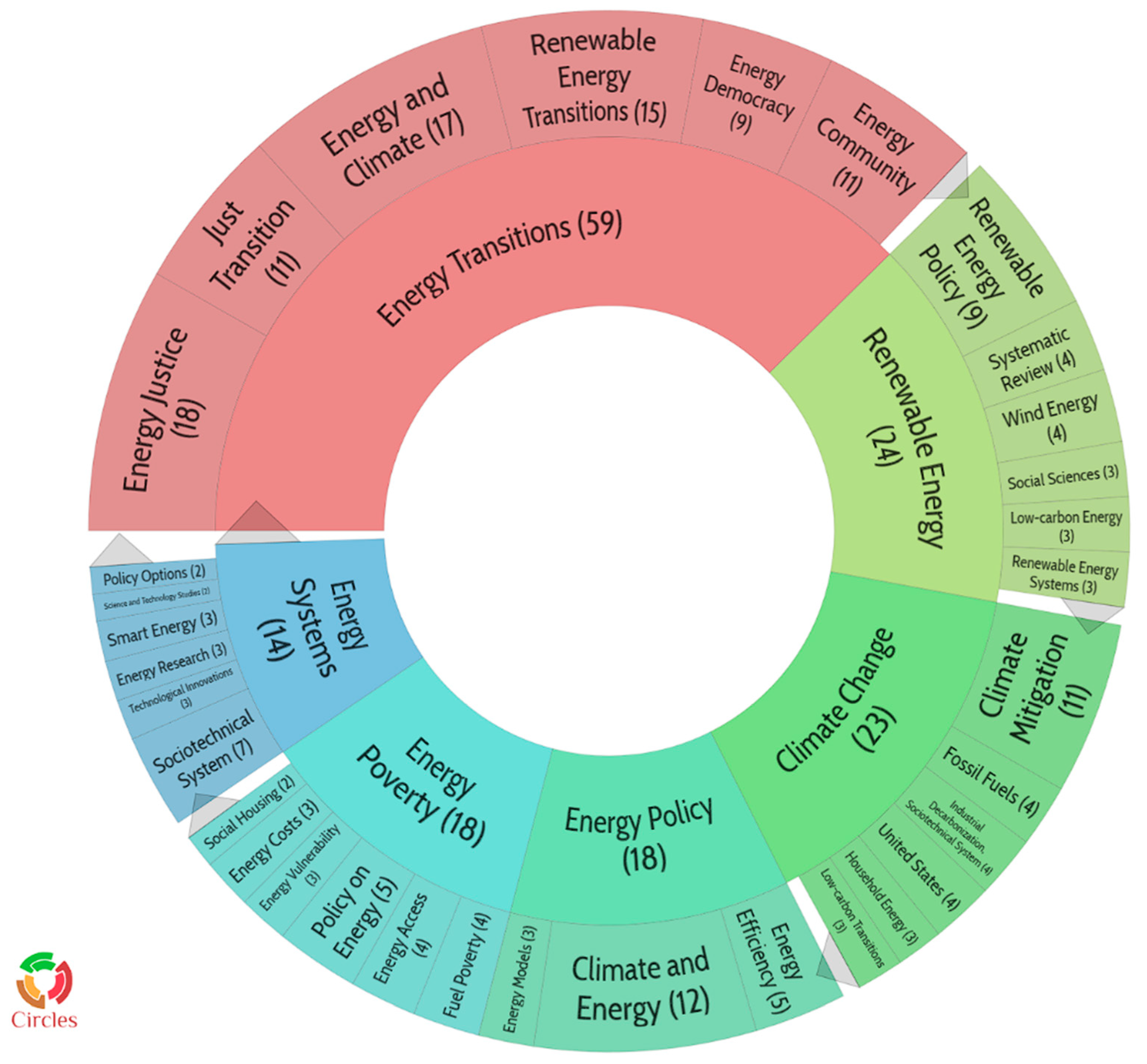
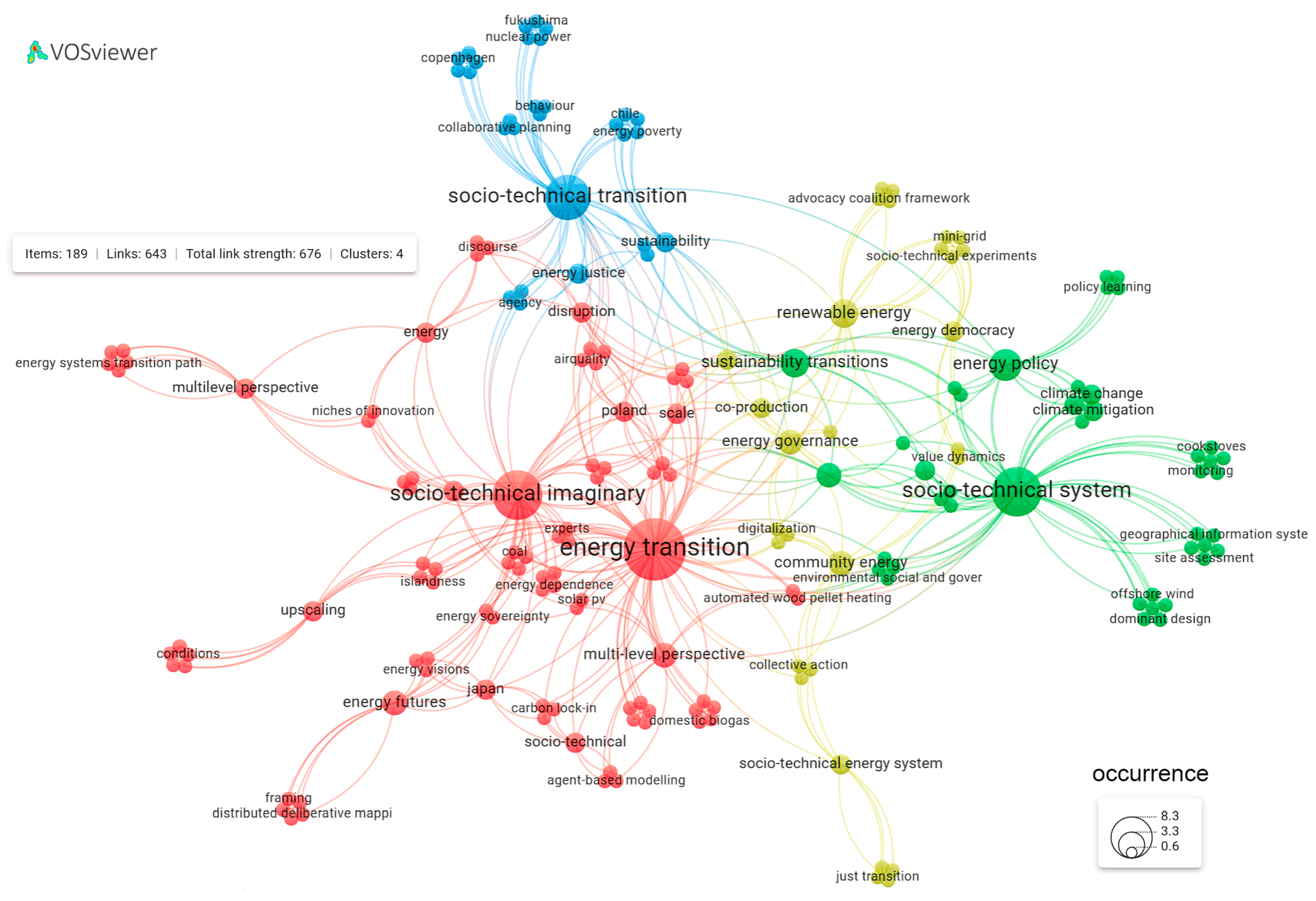
| AKWs | TLS | Occ |
|---|---|---|
| socio-technical system | 59 | 12 |
| renewable energy | 40 | 8 |
| energy democracy | 21 | 5 |
| sustainability transitions | 21 | 5 |
| science and technology studies | 20 | 4 |
| community energy | 19 | 4 |
| energy governance | 14 | 3 |
| energy poverty | 11 | 2 |
| sustainability | 11 | 2 |
| upscaling | 11 | 2 |
| co-production | 10 | 2 |
| actor-network theory | 9 | 2 |
| energy community | 9 | 2 |
| science technology and society | 9 | 2 |
| social justice | 8 | 2 |
| social science | 8 | 2 |
| chile | 6 | 1 |
| cookstoves | 6 | 1 |
| data and evidence | 6 | 1 |
| dominant design | 6 | 1 |
| AKWs | TLS | Occ |
|---|---|---|
| energy justice | 69 | 16 |
| multilevel perspective | 22 | 5 |
| energy | 17 | 3 |
| transition | 15 | 3 |
| energy futures | 14 | 3 |
| germany | 12 | 2 |
| disruption | 10 | 2 |
| japan | 10 | 2 |
| hydrogen | 9 | 2 |
| place attachment | 9 | 2 |
| social practices | 9 | 2 |
| socio-technical | 9 | 2 |
| socio-technical regime | 9 | 2 |
| china | 8 | 2 |
| action research | 7 | 1 |
| diversity | 7 | 1 |
| identity | 7 | 1 |
| justice | 7 | 1 |
| social psychology | 7 | 1 |
| asia | 5 | 1 |
| AKWs | TLS | Occ |
|---|---|---|
| energy policy | 34 | 7 |
| social acceptance | 25 | 5 |
| just transition | 20 | 4 |
| climate change | 16 | 3 |
| scale | 14 | 3 |
| climate justice | 11 | 2 |
| climate mitigation | 10 | 2 |
| climate policy | 10 | 2 |
| industrial decarbonization | 10 | 2 |
| environmental justice | 9 | 2 |
| indigenous communities | 9 | 2 |
| socio-technical energy system | 9 | 2 |
| inclusive transition policies | 7 | 1 |
| inequality | 7 | 1 |
| low-carbon transitions | 7 | 1 |
| social outcomes | 7 | 1 |
| coal mining | 6 | 1 |
| contested transition | 6 | 1 |
| "powder river basin, wyoming" | 6 | 1 |
| capability approach | 5 | 1 |
| AKWs | TLS | Occ |
|---|---|---|
| energy transition | 115 | 23 |
| socio-technical imaginary | 58 | 12 |
| socio-technical transition | 46 | 10 |
| poland | 12 | 2 |
| airquality | 6 | 1 |
| co-benefits | 6 | 1 |
| energy social sciences and humanities | 6 | 1 |
| households | 6 | 1 |
| sociology of energy | 6 | 1 |
| sociology of the future | 6 | 1 |
| solid fuels | 6 | 1 |
| agency | 5 | 1 |
| coal | 5 | 1 |
| coalscape | 5 | 1 |
| copenhagen | 5 | 1 |
| district heating | 5 | 1 |
| domestic biogas | 5 | 1 |
| energy dependence | 5 | 1 |
| energy models | 5 | 1 |
| energy plans | 5 | 1 |
Disclaimer/Publisher’s Note: The statements, opinions and data contained in all publications are solely those of the individual author(s) and contributor(s) and not of MDPI and/or the editor(s). MDPI and/or the editor(s) disclaim responsibility for any injury to people or property resulting from any ideas, methods, instructions or products referred to in the content. |
© 2023 by the author. Licensee MDPI, Basel, Switzerland. This article is an open access article distributed under the terms and conditions of the Creative Commons Attribution (CC BY) license (http://creativecommons.org/licenses/by/4.0/).





